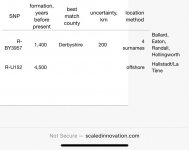Twilight
Regular Member
- Messages
- 956
- Reaction score
- 91
- Points
- 28
- Location
- Clinton, Washington
- Ethnic group
- 15/32 British, 5/32 German, 9/64 Irish, 1/8 Scots Gaelic, 5/64 French, 1/32 Welsh
- Y-DNA haplogroup
- R1b-U152-Z56-BY3957
- mtDNA haplogroup
- J1c7a
Hey guys, R1B-BY3957 is downstream from R1B-FGC36902.
If R1B-Z71 came from Italic tribes, do you know when FGC36902 spread out to England?
Were there any Roman Centurions; or their families that stayed behind in England during the Dark Ages?
Thanks so much in advanced
Source for the pic :
:
https://sennewini.blogspot.com/2017/11/?m=0
If R1B-Z71 came from Italic tribes, do you know when FGC36902 spread out to England?
Were there any Roman Centurions; or their families that stayed behind in England during the Dark Ages?
Thanks so much in advanced
Source for the pic
https://sennewini.blogspot.com/2017/11/?m=0
Last edited:


